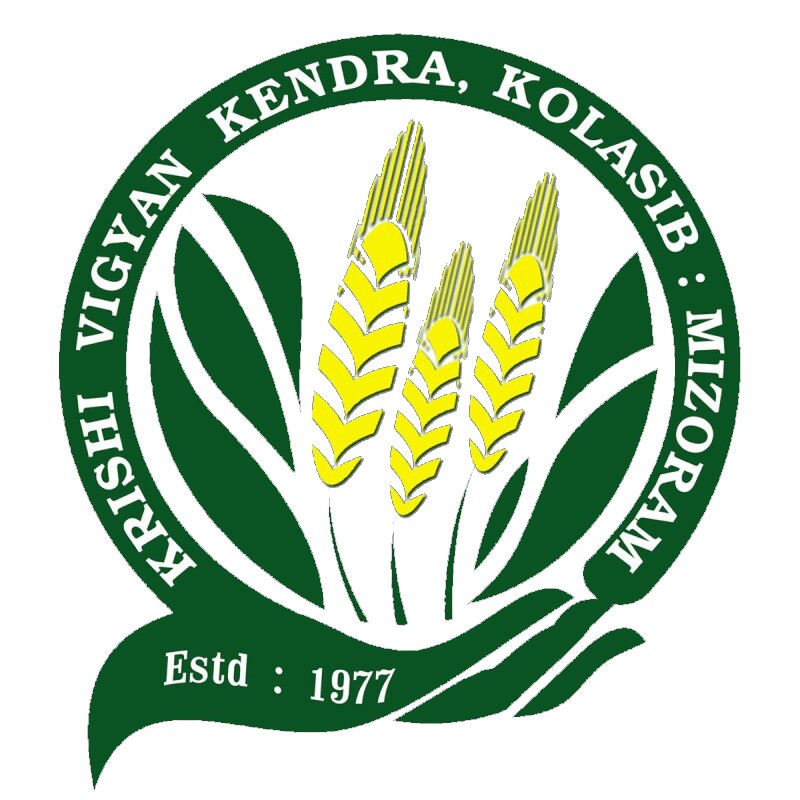Introduction :
KVK, Mizoram was sanctioned by ICAR under the Directorate of Agriculture, Aizawl, Mizoram as host Department, where grass root technology transfer and vocational training instructions designed for bridging the gap between the available technologies at one end and their application for increased production on the other. Mizoram has established KVK centres in eight Districts( KVK Aizawl being under the host of CAU) with a vision to lead agricultural activity in the entire district as a nodal agency and centre of excellence for over all development of agriculture and allied sector with its sound research, extension system in coordination with ICAR Instts. ,SAU scientists & line departments of the State.
Krishi Vigyan Kendra (Farm Science Centre) is an institutional project of Indian Council of Agriculture Research (ICAR) to demonstrate the ‘Application’ of science & technological input of agriculture research and. education on the farmers field in the rural areas with the help of multi-disciplinary team of scientists. It is therefore also called as a Front Line transfer of technology system in the country.
The KVK’s are the activity centres equipped with strong training, demonstrations and development based for bringing about sound and speedier technological revolution and production break through in agriculture and allied fields with higher degree of sustainability.
District wise KVK Centres :
| Krishi Vigyan Kendra (KVK) Click anyone of them to see details | 1) Kolasib 2) Khawzawl 3) Siaha 4) N.Vanlaiphai | 5) Hnahthial 6) Lengpui 7) Lawngtlai 8) Selesih |
Each KVK is manned by 16 staff ( from various agri-allied and other discipline headed by Senior Scientist & Head to carry out need based extension activities.
Aims :
The KVK’s are designed to impart the latest knowledge to the farmers through work experience by employing the principles of “ Teaching by Doing ” and “ Learning by Doing”. The prime goal of KVK is to impart training( Off/On campus) as per needs and requirements in agriculture and allied aspects to all the farmers, farm women, farm youth and school drop outs in the villages. It also provide training ( formal, informal or combination of both) not only in agriculture and allied sectors but also in other income-generating activities that may supplement their family income.
The emphasis is given to provide critical skills so that the trainees may confidently use the technology on their fields to increase agricultural production and productivity.
The other important activity of the KVK is to plan and execute On Farm Testing to test, verify, validate and refine location specific technologies developed by ICAR, ZAR’s and SAU’s and to conduct front line demonstration to disseminate the agricultural technology.
Objectives of KVK :
- To demonstrate new improved technology to the farmers as well as to the extension agencies directly in the farmers field with their active participation.
- To identify the area specific problems of the farmers and prioritization of the identified problems as per their importance.
- To collect feed back from the farmers and extension agencies and to provide linkages with the scientists for the modification or refinement of the technology.
- To impart training to farmers, rural youths and extension functionaries for capacity building.
- To provide new and important information on agriculture and allied sectors to the extension or NGOs for wider circulation to improve their economic condition.
- To prepare different extension models and verify these models in the farmers field with their participation to create confidence among them.
Mandates of the KVK’s:
- Collaboration with the Subject Matter Specialist of SAU’s, CAU’s, Scientists of the Regional Research Station (NARP) and the State Extension Personnel in On-farm training, refining and documenting technologies for developing region-specific sustainable land-use system.
- Organizing training to update the extension personnel within the area of operation with emerging advances in agricultural research on regular basis.
- Organizing long-term vocational training in agriculture and allied sector for rural youths with emphasis on “ learning by doing” for generating self-employment through institutional financing.
- Organizing Frontline Demonstration to generate production data and feed back information.
Unique features of KVK:
- KVK or the Farm Science Centre is a media which takes science from the research systems to the farmers’ door after assessment and refinement.
- Agriculture is always considered as a system, which encompasses several allied disciplines. KVK stands unique in respect to other institutions being working on system approach with core team of multidisciplinary scientists ( working modules of KVK : team or group approach ).
- KVK enjoys strong technology support form host institutes and other research stations.
- KVK act as hinge between different developmental agencies or organizations (private or public), financial institutions, NGOs, Cooperatives and farmers/farmers group in implementing different developmental activities intended for socio- economic upliftment.
- KVK acts as knowledge centre in the rural areas in every fact i.e. addressing/disseminating knowledge on natural resource conservation, climate or ecological changes, agriculture and environment, human diet- health- disease prevention, zoonosis, impact analysis of developed technologies, ICT in agriculture , intelligent purchasing etc.
Role of KVK in changing perspective of global agricultural scenario:
- In the eve of globalization and hanging nature of agricultural system, KVK will assess and refine different technologies for farmers and assist them to choose the technologies to be adopted in their system.
- Management of the new technologies at farmers’ level and providing feed back to the research system for refinement.
- Helps in proper utilization of man-made and natural –resources.
- Diversification of agricultural system.
- Adoption of Need and Market based farming system.
- Increasing the risk bearing capacity of farmers by popularizing group or collaborative approaches and integration of farming systems.
- Effective forward and backward linkages.
- Protection of farmers’ right and educating them about trade treaties and preparedness required for the change.

















